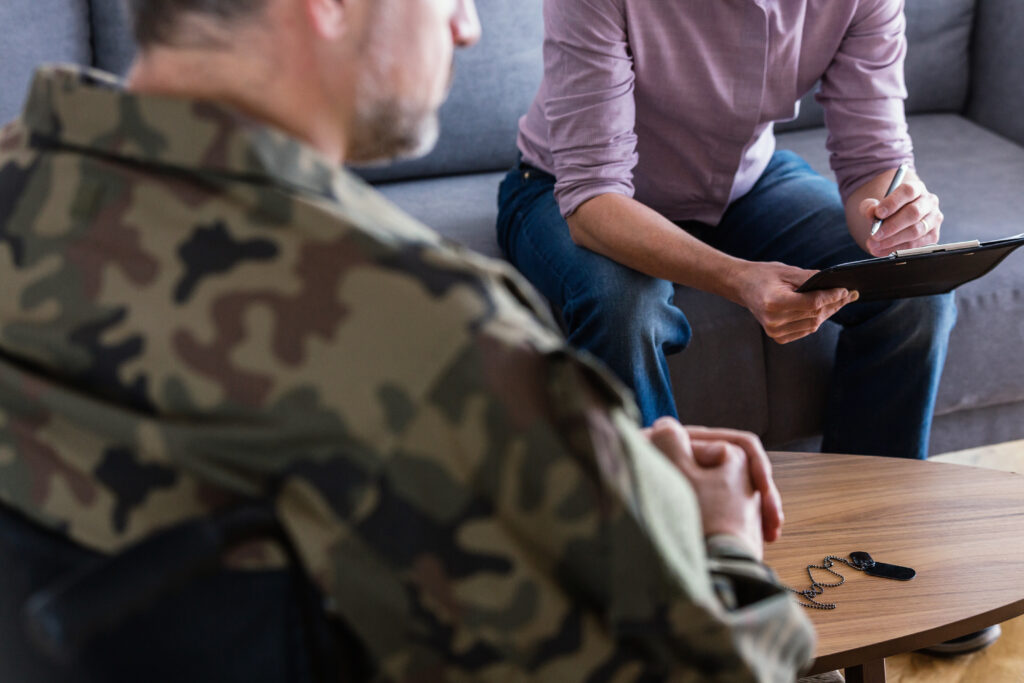A career in the military is stressful. When military personnel can’t switch from high intensity to “At Rest, Soldier”, that stress can build and build. The resulting anxiety can damage your health, manifest in your behavior on the job, derail your advancement, and impact your family. Private, discreet psychiatric help for members of the military and veterans can be life-transforming.[/vc_column_text][vc_column_text]Anxiety affects everyone — including successful officers and NCOs. Military personnel can experience prolonged periods of stress that can make anxiety very difficult to handle. If you need help with anxiety, I offer discreet psychiatric care with a strong understanding of what life is like for military service members and veterans.Being successful in the military means meeting high standards. Physical fitness. Leadership. Mastery of technical material.
At some point, however, the stress may become too much and starts interfering with your life. You may have reached a plateau where you can no longer keep outdoing your own best. You may be competing against progressively more capable peers as you rise through the ranks. You may have returned from difficult tours of duty and need professional guidance to work through your experiences.Military service personnel and veterans are often more prone to anxiety than the wider public. There could be several reasons for this. It’s possible that people who tend towards generalized anxiety are subconsciously attracted to army service.
For example, the military ideals of devotion to hard work, conscientiousness, and perfectionism align perfectly with the highly ambitious personality types that are most prone to anxiety.
As a member of the military, you are expected to do whatever it takes to get the job done. That’s a lot. When you add in the expectations to step up to volunteer as needed, work well in a team, meticulously follow orders, adhere to procedures, take extreme risks, and face possible future assignments that can separate you from family — it is no wonder that anxiety is prevalent in the military.Military personnel often develop anxiety as a result of separation from their families. If you’ve been deployed for active duty, of course, you’d be concerned for your loved ones’ welfare should anything happen to you during military service. Considering that deployment can be for extended periods, the uncertainty of where you’ll be and what will happen can be quite torturous.
The military is not famous for its soft skills. The conditions to help you “toughen up”, with little to no airspace for processing the human experience, may indeed help you get on with the job but they can leave lasting emotional scars. You may have signed up for military service, but that doesn’t negate the reality that you’re a person, with very real human experiences that need to be given the time of day and worked through.
Normal levels of anxiety skyrocket among personnel who had difficult experiences in active service. The associated repercussions — sometimes including flashbacks, night terrors, or other PTSD symptoms inevitably keep resurfacing as an anxiety-provoking re-experiencing of the trauma, until they’re ultimately addressed.
Just because the military rarely provides a safe forum to process your experiences, doesn’t dissolve the need for it. If even completely benign work environments offer discrete private employee mental health programs as a matter of course, how much more so should the military?Even if there is an employee mental health program available, the stigma of accessing such services would in itself act as a deterrent to using it (let alone the fear of how this might affect future promotions or opportunities within the military). You don’t want to be ousted from your role or overlooked for a promotion, so you continue to persevere and suffer in silence indefinitely.
Don’t let anxiety keep you from living your best life any longer!
If you:
- Have a need for discretion and confidentiality
- Don’t want to wait weeks or even months for an appointment and
- Want to be able to send me messages between appointments,
Then call me and let’s have a discrete confidential chat to see how I can help you. The two main treatments for anxiety are psychotherapy and/or medication. It often takes some trial and error to determine which medications or approaches in psychotherapy will be most effective for you. We will work together — and with your therapist, if you are seeing one — to tailor treatment for you.



